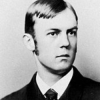Charles Horton Cooley

Charles Horton Cooley
Charles Horton Cooleywas an American sociologist and the son of Thomas M. Cooley. He studied and went on to teach economics and sociology at the University of Michigan, and he was a founding member and the eighth president of the American Sociological Association. He is perhaps best known for his concept of the looking glass self, which is the concept that a person's self grows out of society's interpersonal interactions and the perceptions of others...
NationalityAmerican
ProfessionSociologist
CountryUnited States of America
men individuality bread
Each man must have his I; it is more necessary to him than bread; and if he does not find scope for it within the existing institutions he will be likely to make trouble.
children arrogance credit
There is nothing less to our credit than our neglect of the foreigner and his children, unless it be the arrogance most of us betray when we set out to "Americanize" him.
sex passion power
The more developed sexual passion, in both sexes, is very largely an emotion of power, domination, or appropriation. There is no state of feeling that says mine, mine, more fiercely.
ambition passion self
The passion of self-aggrandizement is persistent but plastic; it will never disappear from a vigorous mind, but may become morally higher by attaching itself to a larger conception of what constitutes the self.
peace attitude giving
By recognizing a favorable opinion of yourself, and taking pleasure in it, you in a measure give yourself and your peace of mind into the keeping of another, of whose attitude you can never be certain. You have a new source of doubt and apprehension.
life power inspire
The need to exert power, when thwarted in the open fields of life, is the more likely to assert itself in trifles.
opportunity development progressive
Freedom is the opportunity for right development, for development in accordance with the progressive ideal of life that we have in conscience.
currents american-life
The actual God of many Americans... is simply the current of American life.
kindness animal top-down
Kindliness seems to exist primarily as an animal instinct, so deeply rooted that mental degeneracy, which works from the top down,does not destroy it until the mind sinks to the lower grades of idiocy.
world genius mediocrity
A talent somewhat above mediocrity, shrewd and not too sensitive, is more likely to rise in the world than genius.
freedom causes increase
Every general increase of freedom is accompanied by some degeneracy, attributable to the same causes as the freedom.
thinking mind action
Unless a capacity for thinking be accompanied by a capacity for action, a superior mind exists in torture.
class play ideas
The idea of freedom is quite in accord with a general, though vague, sentiment among us; it is an idea of fair play, of giving everyone a chance; and nothing arouses more general and active indignation among our people than the belief that some one or some class is not getting a fair chance.
strong hate imagination
When we hate a person, with an intimate, imaginative, human hatred, we enter into his mind, or sympathize -- any strong interest will arouse the imagination and create some sort of sympathy.